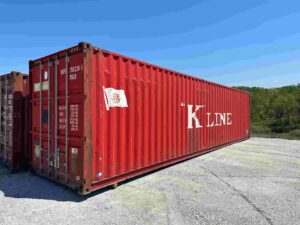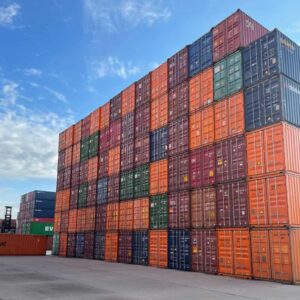Table of Contents
- Introduction
- Why Shipping Containers?
- Types of Shipping Containers and Their Uses
- Choosing the Right Shipping Container
- Tips for Using Shipping Containers Effectively
- Get the Shipping Crate You Need at VersaVault
Picture this: a busy little bakery with the smell of fresh bread and pastries floating out onto the street, luring in anyone passing by. But behind the scenes? Total chaos. The storeroom is jam-packed with flour bags, sugar stacked high, and baking supplies piling up like there’s no tomorrow. The owner—who’s a pro at her craft—keeps tripping over boxes, constantly searching for what she needs, and getting more frustrated by the day. Sound familiar?
It’s not just bakeries, though. Businesses of all sizes get stuck with the same storage problems. Tiny spaces, no security, complete mess—these are just a few headaches that slow everything down, mess with productivity, and—let’s be real—can drain your profits. And who can forget how expensive traditional storage can be, like renting a warehouse or building more storage areas?
But…what if there was a better option? One that’s practical, doesn’t cost an arm and a leg, and could be surprisingly useful? Well, check out the mobile shipping container—yup, that plain old steel box is shaking up how businesses handle their storage problems.
Why Shipping Containers?
Alright, so you’re probably thinking, “Shipping containers? Really?” But stick with us on this—there’s actually some real perks to these steel boxes that make ‘em way better than the usual storage options.
First off, they’re tough. Like, really tough. They’re made to survive trips across oceans, through storms and wild waves, so handling a bit of rain or snow is no big deal for them. That ruggedness means whatever you store inside—inventory, equipment, whatever—gets solid protection. It’s like having your own mini fortress, keeping your stuff safe from theft, vandalism, and whatever nature throws at it.
Then, let’s talk money. Renting warehouse space or building something permanent? Yeah, that’ll empty your wallet pretty fast. But shipping containers? Way cheaper, especially if you go with used or refurbished ones. You get all that secure storage without blowing your budget. Who wouldn’t be into that?
But here’s the real kicker: flexibility. Need to move your storage somewhere else? Easy. Just load the container and take it wherever you need it. Want to turn one into a custom workspace or a pop-up shop? Throw in some doors, windows, insulation—and bam, it’s a totally new space. You can pretty much turn it into anything your business needs. It’s like a blank canvas, just waiting for your ideas.
Oh, and bonus—these containers are eco-friendly. Repurposing them keeps them out of landfills and cuts down on waste. So you get a solid storage solution, and it’s good for the planet. That’s a win-win right there.
Types of Containers and Their Uses
Not all shipping containers are the same. Depending on what you need, they come in different sizes and setups. For most businesses, you’ll probably want either a 20-foot or 40-foot container. To give you an idea, a roomy one-car garage is similar to the 20-footer—perfect for storing equipment, inventory, or supplies if you’re a small business needing extra space. The 40-footer, though, has double the room, so it’s great if you’ve got larger stuff to store or run a bigger business.
Now, the fun part—these containers do more than just hold boxes. You can turn them into temporary offices or workspaces with a little imagination. Perfect for pop-up events, construction sites, or even a growing business that’s not ready to commit to a long-term lease.
Why not consider a mobile kiosk or pop-up shop if you’re in retail? Adding doors, display windows, and even AC is easy to create a cool, eye-catching retail space that you can set up practically anywhere.
And don’t forget—these containers were originally made for hauling goods. A shipping container provides a safe and weatherproof way to move inventory between locations or ship products across the country.
Choosing the Right Container
Nice! You’re on board with shipping containers, but now the real question is: which one fits your business best? Let’s break down what to consider.
First off, size matters. Figure out how much space you need and what you’re storing. A 20-foot container might be all you need if you don’t have too much inventory, but if you’ve got larger equipment or more stuff, go for the 40-foot container. It’s really about what you’ll use it for and matching the container to your specific needs.
Think about the condition next. A newer container may be what you need, or maybe a used or refurbished one works better for your budget. One-trip containers (which is what we call the “new” ones) come at a higher price, but they’re in much better shape. However, used containers might save you some cash and add a bit of well-traveled character. Just make sure they’re in good condition by giving them a thorough check.
And hey, customization is a big plus. Extra windows or doors? Insulation or ventilation to keep things cool or warm? No problem! You can tweak these containers to meet your business needs with different features. It’s like playing with giant Legos, only way more industrial.
Tips for Using Shipping Containers Effectively
Now that you’ve got your container, let’s put do something with it! But before you start putting stuff inside, make a plan. Maximizing a shipping container isn’t about cramming it full, it’s about using the space smartly, keeping things accessible, and protecting your valuables.
First off, consider the climate. If the location of the container requires it or depending on what you’re storing, you might need to add insulation, ventilation, or even a full climate control system. Nobody wants to open the container to find frozen paperwork or a melted stash of chocolate.
Now, get organized. Go vertical! Racks, stackable bins, and shelves are your best friends for using the space efficiently. Label everything so you don’t end up playing hide-and-seek with your items later.
Finally, security. At the very least, you’ll need a sturdy lock, but alarms, motion sensors, or security cameras are also worth considering. It’s smart to protect what you’ve invested in, both the container and its contents.
Get the Shipping Crate You Need at VersaVault
Shipping containers are an affordable, secure, and surprisingly flexible answer to your business’s storage problems. Running out of room for flour and sugar in a bakery, juggling equipment in a construction company, or wanting to stand out with a pop-up shop as a retailer, these steel boxes offer tons of options.
With their durability, weather resistance, and ability to adapt to various needs—not to mention their eco-friendliness—shipping containers are changing how businesses handle storage. No longer just for moving goods across the ocean, they’re shaking up industries one container at a time.
Say goodbye to storage headaches and get a smarter, more efficient solution. We had a feeling you’d be ready. If you’re in the area and looking for a storage container in Pennsylvania, reach out to VersaVault for a free consultation or quote. You’ll find the perfect container for your business needs and budget—and trust us, no regrets.
Key Takeaways
- Shipping containers offer a practical, cost-effective storage solution compared to traditional options like warehouses, providing secure and flexible storage for businesses of all sizes.
- Containers are highly durable and weather-resistant, originally built to withstand extreme conditions, making them ideal for protecting inventory, equipment, and other valuable items.
- Cost savings come from using used or refurbished containers, which offer security without the high expenses of building or renting permanent storage.
- Containers offer flexibility—they can be easily moved, customized into workspaces, pop-up shops, or kiosks, and can be repurposed to fit various business needs.
- Customizable options include adding insulation, ventilation, windows, doors, and climate control, allowing businesses to adapt containers for their specific requirements.
- Smart usage tips include choosing a solid foundation, climate considerations, using vertical storage solutions, and ensuring security through locks and surveillance.
- VersaVault offers consultation and storage solutions helping businesses find the right shipping container for their needs and budget.



